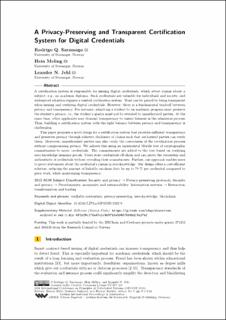| dc.contributor.author | Queiroz Saramago, Rodrigo | |
| dc.contributor.author | Meling, Hein | |
| dc.contributor.author | Jehl, Leander Nikolaus | |
| dc.date.accessioned | 2023-05-03T08:21:37Z | |
| dc.date.available | 2023-05-03T08:21:37Z | |
| dc.date.created | 2023-04-11T14:02:39Z | |
| dc.date.issued | 2023 | |
| dc.identifier.citation | Saramago, R. Q., Meling, H., & Jehl, L. N. (2023). A Privacy-Preserving and Transparent Certification System for Digital Credentials. In 26th International Conference on Principles of Distributed Systems (OPODIS 2022). Schloss Dagstuhl-Leibniz-Zentrum für Informatik. Leibniz International Proceedings in Informatics, 253 9:1-9:24. | en_US |
| dc.identifier.issn | 1868-8969 | |
| dc.identifier.uri | https://hdl.handle.net/11250/3065925 | |
| dc.description.abstract | A certification system is responsible for issuing digital credentials, which attest claims about a subject, e.g., an academic diploma. Such credentials are valuable for individuals and society, and widespread adoption requires a trusted certification system. Trust can be gained by being transparent when issuing and verifying digital credentials. However, there is a fundamental tradeoff between privacy and transparency. For instance, admitting a student to an academic program must preserve the student’s privacy, i.e., the student’s grades must not be revealed to unauthorized parties. At the same time, other applicants may demand transparency to ensure fairness in the admission process. Thus, building a certification system with the right balance between privacy and transparency is challenging.
This paper proposes a novel design for a certification system that provides sufficient transparency and preserves privacy through selective disclosure of claims such that authorized parties can verify them. Moreover, unauthorized parties can also verify the correctness of the certification process without compromising privacy. We achieve this using an incremental Merkle tree of cryptographic commitments to users' credentials. The commitments are added to the tree based on verifying zero-knowledge issuance proofs. Users store credentials off-chain and can prove the ownership and authenticity of credentials without revealing their commitments. Further, our approach enables users to prove statements about the credential’s claims in zero-knowledge. Our design offers a cost-efficient solution, reducing the amount of linkable on-chain data by up to 79% per credential compared to prior work, while maintaining transparency. | en_US |
| dc.language.iso | eng | en_US |
| dc.publisher | Schloss Dagstuhl-Leibniz-Zentrum für Informatik | en_US |
| dc.rights | Navngivelse 4.0 Internasjonal | * |
| dc.rights.uri | http://creativecommons.org/licenses/by/4.0/deed.no | * |
| dc.title | A Privacy-Preserving and Transparent Certification System for Digital Credentials | en_US |
| dc.type | Peer reviewed | en_US |
| dc.type | Journal article | en_US |
| dc.description.version | publishedVersion | en_US |
| dc.rights.holder | The authors | en_US |
| dc.subject.nsi | VDP::Teknologi: 500 | en_US |
| dc.source.pagenumber | 9:1-9:24 | en_US |
| dc.source.volume | 253 | en_US |
| dc.source.journal | Leibniz International Proceedings in Informatics | en_US |
| dc.identifier.doi | 10.4230/LIPIcs.OPODIS.2022.9 | |
| dc.identifier.cristin | 2140011 | |
| cristin.ispublished | true | |
| cristin.fulltext | original | |
| cristin.qualitycode | 1 | |

